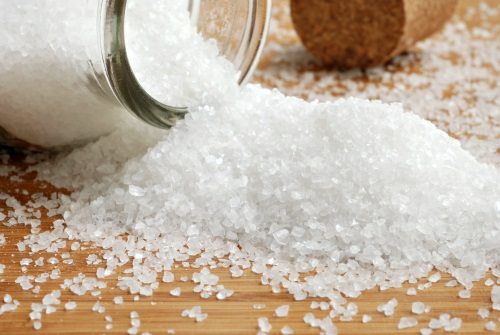People on the US eat too much salt, and most have no idea how much they are eating, according to new consumer research by the American Heart Association.
Nearly all of the 1,000 people surveyed by the American Heart Association (97%) either underestimated or could not estimate how much sodium they eat every day.
Too much sodium in the diet can increase risk for high blood pressure, stroke, heart disease and other major health problems.
Most people who underestimated their sodium consumption in the survey were off by around 1,000 mg, considering the association recommends 1,500 mg a day for ideal heart health.
Most Americans are found to consume more than double that.
In an effort to help people better understand and limit their sodium intake, the American Heart Association has launched a new awareness campaign called “I Love You Salt, But You’re Breaking My Heart.”
The campaign includes a website and an online pledge for people to commit to reduce how much sodium they eat, along with a new video, “Don’t Let Salt Sneak Up on You” to show how sodium is sneaking into our foods.
The site also features a blog, sodium quiz and infographics, links to lower-sodium recipes and educational articles.
Limiting salt in the bigger picture — the U.S. food supply — is an important goal of the campaign.
That is because 75% of Americans’ sodium consumption is from processed, prepackaged, and restaurant foods — not the salt shaker.
“It’s challenging for Americans to stick to sodium intake recommendations because most of the sodium we eat in this country is added to our food before we buy it,” said president Elliott Antman, M.D., professor of medicine at Harvard Medical School and a senior physician in the Cardiovascular Division of the Brigham and Women’s Hospital in Boston.
“In order to really make a difference in the health of all Americans, we must reduce sodium in the food supply through the support of food manufacturers, food processors and the restaurant industry.”
Cardiovascular disease is the leading cause of death and disability worldwide, and high blood pressure is a major risk factor.
One-third of American adults have high blood pressure, and about 90% of American adults are expected to develop high blood pressure over their lifetimes.
Children, too, are at risk of developing heart disease and elevated blood pressure at an earlier age.
Nearly 80% of one to three-year-olds and more than 90% of four to 18-year-olds eat too much sodium.
“America’s health could take a turn for the better if more Americans focused on their sodium intake,” Antman said.
“The American Heart Association encourages people to reduce their sodium intake by comparing product labels and selecting the option with less sodium, limiting the consumption of processed, prepackaged, and restaurant foods, and by substituting salt with herbs, spices, citrus juice, or vinegars to season food.”
Reducing current sodium intake by 1,200 mg a day has been estimated to prevent between 44,000 and 92,000 deaths per year and save between US$10 billion and US$24 billion annually in healthcare costs.










